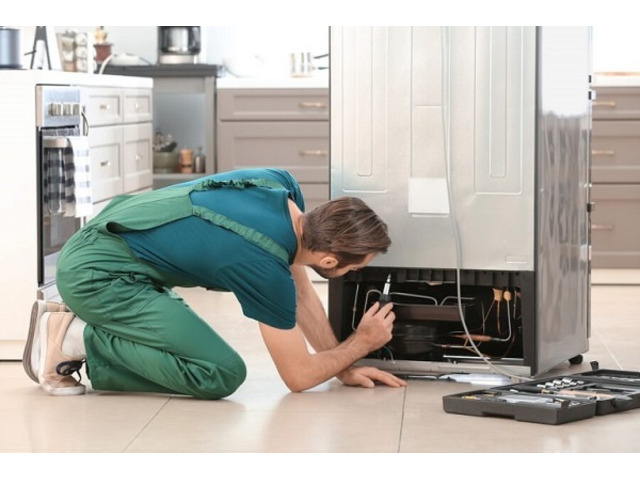
Commercial refrigerators are vital appliances for businesses in the food industry, ensuring the freshness and safety of perishable goods. However, like any mechanical system, they can experience issues over time. Recognizing the signs indicating the need for professional repair is crucial to prevent food spoilage, maintain regulatory compliance, and avoid costly downtime. In this article, we’ll explore the top signs that indicate your commercial refrigerator repair requires professional attention.
Temperature Fluctuations: One of the most critical functions of a commercial refrigerator is maintaining a consistent temperature to preserve food safely. If you notice frequent temperature fluctuations, it could indicate various issues, such as a malfunctioning thermostat, compressor problems, or insufficient coolant levels. Even minor temperature fluctuations can compromise food quality and safety, making prompt repair essential.
Excessive Frost Build-Up: While some frost build-up inside a commercial refrigerator is normal, excessive or rapid accumulation could signal underlying issues. Common causes include a faulty defrost system, damaged door seals, or inadequate airflow. Excessive frost can impede the refrigerator’s efficiency, leading to higher energy consumption and potential food spoilage. A professional technician can diagnose the root cause and restore proper functionality.
Unusual Noises: Commercial refrigerators typically produce low-level operational sounds, but any sudden or unusual noises should raise concerns. Grinding, banging, or squealing sounds could indicate problems with the compressor, fan motors, or other internal components. Ignoring these noises can result in further damage and costly repairs down the line. A skilled technician can identify the source of the noise and perform the necessary repairs to prevent further complications.
Water Leaks: Water leaks around or inside the commercial refrigerator are not only unsightly but also indicate potential issues with the appliance. Leaking water could stem from a variety of sources, such as a clogged drain line, damaged door gaskets, or a malfunctioning water inlet valve. Pooled water can lead to mold growth, electrical hazards, and damage to the surrounding flooring. Professional repair is essential to address the root cause and prevent further water damage.
Inefficient Cooling: If you notice that your commercial refrigerator is struggling to maintain the desired temperature despite normal operating conditions, it may indicate a refrigeration system problem. Reduced cooling efficiency could result from compressor issues, refrigerant leaks, or blocked airflow. Inefficient cooling not only compromises food safety but also increases energy costs. A qualified technician can diagnose the issue and restore optimal cooling performance.
Excessive Energy Consumption: Monitoring energy consumption is crucial for businesses seeking to optimize operational costs and sustainability. The commercial refrigerator repair‘s sudden spike in energy usage could indicate underlying mechanical issues. Common causes include compressor inefficiency, refrigerant leaks, or malfunctioning components. Addressing these issues promptly through professional repair can help lower energy bills and extend the appliance’s lifespan.
Persistent Odors: Foul or unusual odors emanating from the commercial refrigerator can be a sign of food spoilage, but they can also indicate mechanical problems. A malfunctioning evaporator fan, dirty condenser coils, or mold growth inside the unit can contribute to unpleasant odors. Ignoring persistent odors not only affects food quality but also poses health risks to employees and customers. Professional cleaning and repair can eliminate odors and ensure a sanitary environment.
Frequent Cycling: Commercial refrigerators typically undergo regular cooling cycles to maintain the desired temperature. However, frequent or excessively short cycling could indicate issues with the thermostat, compressor, or refrigerant levels. Cycling problems not only strain the appliance’s components but also lead to inconsistent temperature regulation and increased energy consumption. Professional diagnosis and repair are necessary to restore proper cycling and prolong the refrigerator’s lifespan.
Conclusion: A malfunctioning commercial refrigerator can disrupt operations, compromise food safety, and increase operating costs for businesses in the food industry. By recognizing the signs indicating the need for professional repair, such as temperature fluctuations, excessive frost build-up, unusual noises, water leaks, inefficient cooling, excessive energy consumption, persistent odors, and frequent cycling, businesses can take proactive measures to address issues promptly. Investing in professional repair services ensures the continued reliability, efficiency, and longevity of commercial refrigeration systems, ultimately safeguarding business operations and reputation. Regular maintenance and timely repairs are essential for preserving food quality, ensuring regulatory compliance, and maximizing profitability in the foodservice industry.